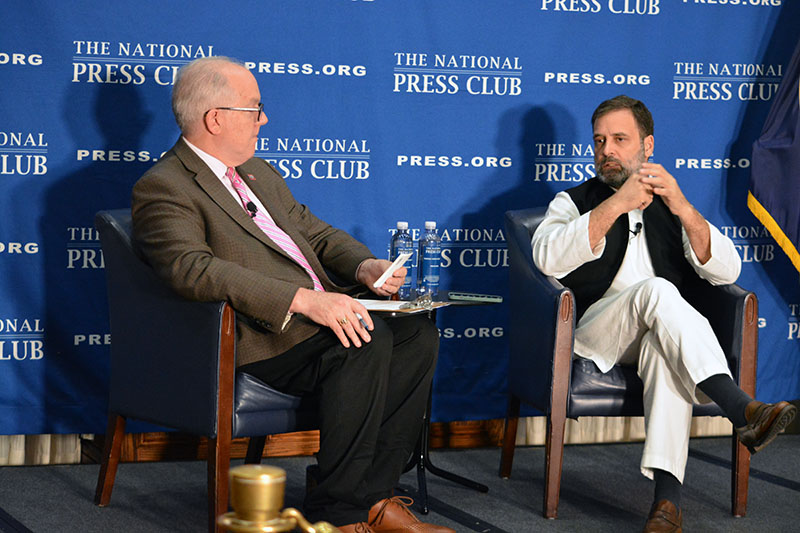Moderator Cary O'Reilly, vice chair of the Events Committee, noted that an Indian journalist colleague had been arrested and accused of spying.
“There is a weakening of press freedom. Everyone notices it. The world can see it,” Gandhi said. A collapse of Indian democracy would have worldwide impact, but he said the country can regain lost ground.
“India has a very robust system already in place," he said. "If the democratic conversation is allowed to be fostered, then it will heal itself.”
Gandhi, the son of the late Prime Minister Rajiv Gandhi, the grandson of the late Prime Minister Indira Gandhi, and the great-grandson of India’s founding prime minister, Jawaharlal Nehru, is expected to once again challenge Modi in 2024. Modi's party won by a landslide in the last election held in 2019. Polls say Modi continues to be popular throughout India with approval ratings above 75 percent.
“I walked across India. I talked directly to millions of people," Gandhi said, referring to his "Unite India" pilgrimage, or yatra, during which he walked more than 2,000 miles, from India's southern tip in Tamil Nadu to Srinagar in Kashmir, over 150 days. "They didn’t seem very happy to me.”
He is optimistic that his party can regain seats in parliament from Modi's Bharatiya Janata Party (BJP).
“We will do very well in the next election. I think we’ll surprise people," he said. “If you do the math, a united opposition will defeat the BJP.”
He contrasts his Indian National Congress party, which promotes decentralization of power and sees small and medium industries as the engines of growth, with BJP, which, he says, takes a centralized view of power and depends on a few massive industries instead.
"We’re facing a particular vision of the world—a Chinese vision—productivity and prosperity under a non-democratic structure," Gandhi said. "We have to think about productivity and prosperity in a democratic framework."
He disputed results from independent studies that show the economy has improved since Modi’s election.
“What we see on the ground is massive unemployment and dramatic increases in prices," he said. “There is a set of people who have a huge amount of wealth, and there’s a large mass of Indian people who are poor and struggling.”
Gandhi said those very struggles are what keeps him immersed in politics despite the threat of political retribution, including assassinations that claimed the lives of both his father and grandmother.
"I love my people, in particular, the people who are struggling. I have a bias toward them," he said. “I’ve grown up with a narrative, a Gandhian narrative of what the country is, what it should look like, what’s important. That’s what drives me.”

